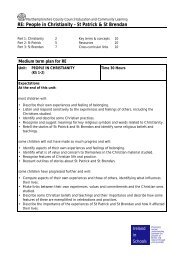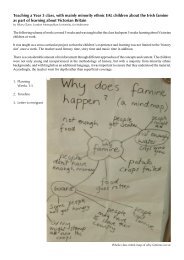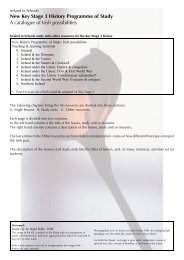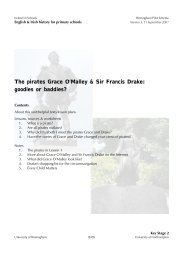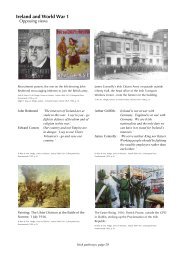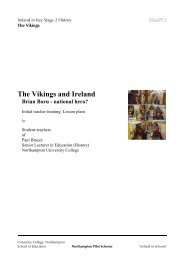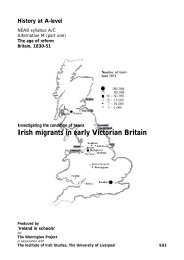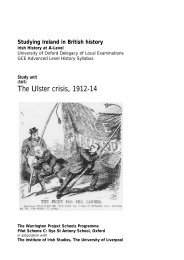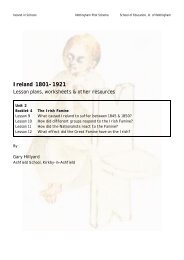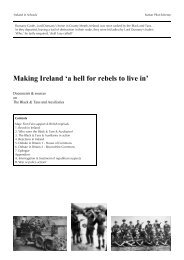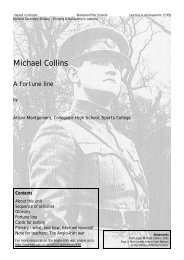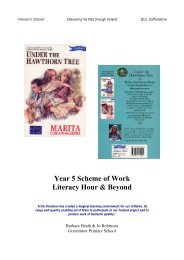E:\Irish music\A4 Irish history in song 1 & 2.wpd - Ireland in Schools
E:\Irish music\A4 Irish history in song 1 & 2.wpd - Ireland in Schools
E:\Irish music\A4 Irish history in song 1 & 2.wpd - Ireland in Schools
Create successful ePaper yourself
Turn your PDF publications into a flip-book with our unique Google optimized e-Paper software.
There is little political realism <strong>in</strong> most of these <strong>song</strong>s, but the sweet mixture of haz<strong>in</strong>ess and magiccommonly attributed to <strong>Irish</strong> poetry is hardly to be found either.Artistic merit - aga<strong>in</strong>stStreet ballads, of a political nature or otherwise, have been ignored or dismissed as unworthy ofconsideration by most literary critics. Scholars who study folk <strong>song</strong>s often despise the more modernbroadsides, or hold them responsible for a decay of oral tradition and a perversion of popular taste.To present the bulk of these texts as poetry would <strong>in</strong>deed be ludicrous. Their form is usually clumsy <strong>in</strong>the extreme, and what is not trivial is all too often <strong>in</strong>congruous. Elements borrowed from folklore or fromlearned literature are likely to be more or less debased. The poorness of these street ballads is <strong>in</strong> itselfsignificant; it shows to what the <strong>Irish</strong> people, kept <strong>in</strong> misery and deprived of their own culture, werereduced <strong>in</strong> the greater part of the last century. There is someth<strong>in</strong>g pathetic <strong>in</strong> the descriptions given bysome travellers of the ragged crowds who swarmed around the street s<strong>in</strong>gers and followed them step bystep, eagerly listen<strong>in</strong>g to their wretched <strong>song</strong>s.Artistic merit - forIt is usually admitted that these texts deserve to receive serious consideration as historical or sociologicaldocuments; but have they no other merit?The really unassum<strong>in</strong>g <strong>song</strong>s have at least virtues of spontaneity and straightforwardness, not easily tobe found at a more <strong>in</strong>tellectual level. They may have the primitive charm of naive pa<strong>in</strong>t<strong>in</strong>g. Folksimplicity is attractive, as <strong>in</strong> ‘The Croppy Boy’ for <strong>in</strong>stance, and it can have nobility, as <strong>in</strong> some stanzasof the ballads on ‘Michael Boylan’, and ‘General Munroe’.When the authors have not been misled by the tendency to imitate sophisticated literature, theiruntutored attempts to put <strong>in</strong>to words their thoughts and feel<strong>in</strong>gs, awkward as they appear, are orig<strong>in</strong>aland eloquent. Even <strong>in</strong> a dull and trite piece a few l<strong>in</strong>es can show a vivid image and a f<strong>in</strong>e vigour. And <strong>in</strong>many cases the emotional power of the words is greatly enhanced by beautiful melodies.The methods of literary criticism are hardly applicable to such texts, and subtle aesthetic appreciationwould be lost on them. The authors of the best ballads had limited ambitions. Their <strong>song</strong>s were writtenfor immediate use, not for posterity, and they strived to please virtually unlettered people, not fastidiousamateurs of f<strong>in</strong>e literature. Yet some of them have lived on vigorously among the people; almost a quarterof the texts reproduced <strong>in</strong> this book are still heard to-day, though often <strong>in</strong> a different version. For a largepart of the <strong>Irish</strong> audience, much of their content is perhaps not too clear now, but their impact may stillbe great....Importance of contextWe must remember that, poor as these ballads may seem on paper, a number of them assume unexpecteddimensions when sung by a genu<strong>in</strong>e <strong>Irish</strong> s<strong>in</strong>ger <strong>in</strong> the right surround<strong>in</strong>gs. A <strong>song</strong> is more than a text anda melody which can be recorded or pr<strong>in</strong>ted, exam<strong>in</strong>ed and criticized. It is the result of a communal stateof m<strong>in</strong>d and it depends on the conjunction of an <strong>in</strong>spired s<strong>in</strong>ger, a receptive audience, and variouscircumstances creat<strong>in</strong>g a favourable mood. In <strong>Ireland</strong>, however, some of these elements seem to defyanalysis.Additional note - folk <strong>song</strong>s v. political balladsA comparison with the <strong>song</strong>s circulated as broadsides and sung <strong>in</strong> the streets <strong>in</strong> various European countries would probably show that the <strong>Irish</strong>texts, on the whole, are not <strong>in</strong>ferior to the others. In some cases they might be notably better, s<strong>in</strong>ce they are closer to oral tradition, but no suchevaluation is possible until research <strong>in</strong> the field of European broadside balladry has been carried further. In most countries, folk <strong>song</strong>s properare better known, but they are not exactly the same th<strong>in</strong>g.Still, a fact which emerges from this study is that the <strong>Irish</strong> political ballads are not altogether alien to traditional literature, however recent theirorig<strong>in</strong> and relatively brief their existence. Even when their authorship is untraceable, they were made by <strong>in</strong>dividuals, but this must have beenthe case with folk <strong>song</strong>s too, and they survived on the condition that they had been moulded on an impersonal tradition. Though they were oftenpropagated <strong>in</strong> pr<strong>in</strong>ted form they were not always static: they could also be committed to memory or handed down by word of mouth andreshaped by each s<strong>in</strong>ger, either to his own taste, or, perhaps unconsciously, to a communal taste expressed through a set of formulae and motifs.There is an <strong>in</strong>terrelationship between oral tradition and popular pr<strong>in</strong>ted literature, as well as between popular and learned cultures.IiS, <strong>Irish</strong> <strong>history</strong> <strong>in</strong> <strong>song</strong> 1 & 2, page 16



